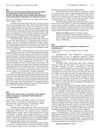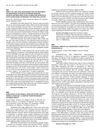 10 citations,
January 2019 in “Archives of Endocrinology and Metabolism”
10 citations,
January 2019 in “Archives of Endocrinology and Metabolism” Testosterone therapy may slightly increase sexual desire in women with HSDD but lacks broad recommendation due to safety concerns and limited approval.
1 citations,
July 2022 in “Frontiers in Pharmacology” Dutasteride may help protect neurons and reduce inflammation in Parkinson's disease.
May 2024 in “Molecules/Molecules online/Molecules annual” Plant extracts can help prevent hair loss and promote hair growth.
 February 2024 in “Brain research bulletin”
February 2024 in “Brain research bulletin” Blocking androgen activity in newborn rats affects body weight and appetite-related hormones differently in males and females.
1 citations,
April 2015 in “Russkij žurnal detskoj nevrologii” Antiepileptic drugs can cause side effects like menstrual problems and infertility in women with epilepsy, but most pregnancies result in healthy babies, with newer drugs being safer.
 November 2016 in “Hair transplant forum international”
November 2016 in “Hair transplant forum international” The conclusion is that more research is needed to understand if the drug finasteride causes Post-Finasteride Syndrome or if it's due to individual genetic makeup.
 20 citations,
April 2011 in “British Journal of Dermatology”
20 citations,
April 2011 in “British Journal of Dermatology” Reflectance confocal microscopy can tell apart white dots on the scalp as either sweat gland ducts or hair follicle openings.
 May 2021 in “Journal of the Endocrine Society”
May 2021 in “Journal of the Endocrine Society” A rare ovarian cancer with a good outlook was found in a woman with unusual hair growth and abdominal symptoms.
 156 citations,
October 1996 in “Science of The Total Environment”
156 citations,
October 1996 in “Science of The Total Environment” Tributyltin exposure causes sex changes, sterilization, and decline in the snail Ocinebrina aciculata, risking its extinction.
 136 citations,
April 2013 in “Clinical Cancer Research”
136 citations,
April 2013 in “Clinical Cancer Research” The drug IPI-926 is safe at 160 mg daily and may help treat certain tumors, especially basal cell carcinoma.
 52 citations,
June 2013 in “The Journal of Clinical Endocrinology and Metabolism”
52 citations,
June 2013 in “The Journal of Clinical Endocrinology and Metabolism” The research found that anovulatory young women have higher androgen and hormone levels than those who ovulate, suggesting immature hormonal regulation rather than a specific condition.
 6 citations,
April 2013 in “International Journal of Dermatology”
6 citations,
April 2013 in “International Journal of Dermatology” Valproic acid helped hair growth in alopecia patient; more research needed.
 2 citations,
December 1997 in “Journal of The American Academy of Dermatology”
2 citations,
December 1997 in “Journal of The American Academy of Dermatology” The document concludes that doctors should monitor children's brain development when treating hemangiomas with interferon alfa and consider stopping the treatment if problems arise, while also exploring drugs that might counteract side effects.
 March 2009 in “The Journal of Urology”
March 2009 in “The Journal of Urology” Low dose finasteride causes only minor changes in PSA levels in men over 50 with BPH.
 March 2009 in “The Journal of Urology”
March 2009 in “The Journal of Urology” Low dose finasteride causes only small changes in PSA levels in older men with BPH.
 3 citations,
June 2004 in “Annales De Dermatologie Et De Venereologie”
3 citations,
June 2004 in “Annales De Dermatologie Et De Venereologie” Four new cases of gynecomastia (male breast enlargement) linked to finasteride (Propecia) have been found.
March 2022 in “Hair transplant forum international” Nutritional correction can restore hair loss caused by stress.
13 citations,
July 2015 in “Archives of dermatological research” N1-methylspermidine helps hair growth and reduces inflammation in hair follicles.
6 citations,
March 2021 in “Frontiers in surgery” A woman's symptoms of increased body hair and testosterone were caused by a rare adrenal tumor, which was removed successfully.
Hair can naturally regain color after greying, and this change may be linked to stress levels.
Hair proteins in preschool children and their mothers could indicate developmental changes and health status.
 August 2022 in “IARS international research journal”
August 2022 in “IARS international research journal” The document concludes that drug repurposing, which is reusing known medicines for new illnesses, can provide faster, cheaper treatment options for various serious diseases, including cancer, COVID-19, and rare diseases.
 April 2023 in “The journal of investigative dermatology/Journal of investigative dermatology”
April 2023 in “The journal of investigative dermatology/Journal of investigative dermatology” Estetrol may help prevent hair loss and promote hair growth in women.
 August 2020 in “Current psychopharmacology”
August 2020 in “Current psychopharmacology” Pregnancy and nursing increase certain brain activities in rats, but these changes disappear when the babies are taken away.















